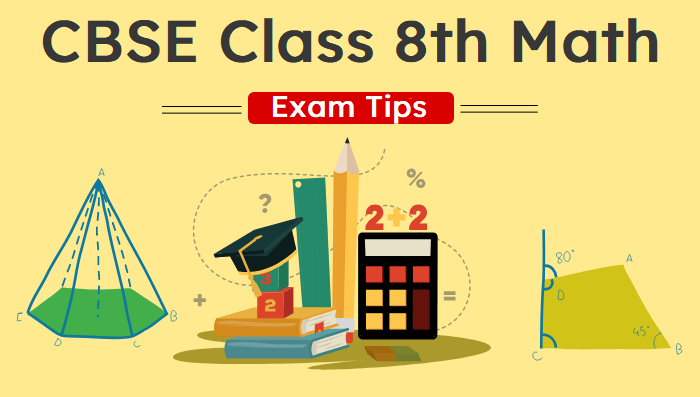Indian certificate of secondary education (ICSE) and Central board of secondary education(CBSE) are the two most important boards when it comes to secondary education in India. The syllabus in ICSE books is considered to be vast and comprehensive unlike the central board of secondary education(CBSE). That is why students of ICSE need to prepare for the exams well ahead to get high scores particularly when it comes to maths subject as some students might get scared of maths. So, this article tells you everything about ICSE class 8 mathematics syllabus, important books, and preparation tips.
ICSE class 8 maths syllabus:
According to the ICSE board guidelines, the syllabus for class 8 mathematics can be categorized into 6.
- Number system: This category includes the chapters like rational numbers, Exponents of powers, Playing with numbers, sets, etc.
- Rational Numbers
- Properties of rational numbers
- rational numbers on the number line
- Exponents Powers
- Laws of exponents with integral powers
- Squares and Square roots using factor method, division method
- Cubes and cubes roots
- Playing with numbers
- Writing and understanding a two and three-digit number in a general and engaging with various puzzles
- Working on the divisibility test rules for the numbers 2, 3, 5, 9, 10 (two or three-digit numbers)
- Sets
- Union and intersection of sets
- Disjoint set
- Complement of a set
2. Ratio and Proportion: Under this category, topics regarding percentages, simple and compound interest, etc will be included.
- percentages, profit & loss, overhead expenses, Discount, tax, and their application in real life
- Difference between simple and compound interest
- Direct and inverse variations
- Time and work problems
3. Algebra: Under the algebra category, problems related to algebraic expressions, properties, etc will be included.
- Algebraic Expressions
- Multiplication and division of algebraic expression
- Identities
- Properties of inequalities.
- Factorization
- Solving linear equations in one variable contextually
4. Geometry: In this category, questions related to quadrilaterals, circles will be included.
a.Understanding shapes
- Properties of quadrilaterals – Angle Sum property
- Properties of a parallelogram
b. Representing 3-D in 2-D
- Identify and match pictures with objects
- Drawing 2-D representation of 3-D objects
- Counting vertices, edges, and faces
- verifying Euler’s relation for 3-D figures
c. Construction of Quadrilaterals by giving
- four sides and one diagonal
- Three sides and two diagonals
- Three sides and two included angles
- Two adjacent sides and three angles
- Reflection symmetry
- Symmetrical shapes
d.Circle
- Circle, center, radius or diameter, arc, chord, sector, and segment
5. Mensuration: This category deals with problems related to areas and volumes of shapes like trapezium, cube, cuboid, cylinder, etc.
- Area of shapes like polygon, trapezium, semi-circle
- The surface area of a cylinder, cube, cuboid
- Total and curved surface areas of various 3-D figures
- Concept of volume and measurement of the volume of 3-D figures
- Data Handling: This category deals with organizing data and representation of the data in bar graphs, pie diagrams, etc.
- Arranging ungrouped data into groups
- Representing the grouped data in bar graphs, constructing the bar graphs, and interpreting them
- Simple Pie charts
You can always get the detailed syllabus of class 8 maths on the internet.
ICSE class 8 maths important books list:
In order to complete your preparation in a full-fledged way, you need to do your preparation from the best books. Since there are many textbooks for ICSE, here is the list of some of the ICSE textbooks for class 8 mathematics.
- ML Aggarwal’s Understanding Mathematics for Class 8
- ICSE Mathematics class 8 by J Chakrabarti
- Concise Mathematics by RK Bansal for Class 8
- Essential ICSE Mathematics for Class 8 by A. Das Gupta and A. Kumar
- Longman ICSE Mathematics Class 8 by V.K. Sehgal
- ICSE New Mathematics Today Class 8 by O.P. Malhotra, S.K. Gupta and Anubhuti Gangal
- Concise Mathematics for Class 8 by Selina publishers
The above books are considered to be important books for preparation for exams. Any book from the above list can greatly help in your preparation. Among them also, the ICSE class 8 mathematics Selina concise solutions are very popular.
Preparation tips:
To get good scores in ICSE examinations, Some things that students need to follow are
- Cover the syllabus before the exam time: Choose any important book of maths designed as per the ICSE board examination syllabus which you can feel at ease and try to cover the complete syllabus before the exam. If you can start your preparation ahead, then you can complete it ahead so that you can revise well enough until the exam starts. Practice the questions until you feel you can solve the problems confidently and comfortably without thinking twice.
- Note down all important formulas: Since we are talking about maths, there will be a lot many formulas to remember. So, note down all the important formulas in one book neatly. So that you can every day take a quick glimpse at those formulas to remember for a long time. You can note down any important concepts. This can help you in your last-minute revision.
- Practice previous years’ question papers: Previous years’ question papers are good sources for practicing the problems. By doing this, students can always keep in check on how well they are preparing. Apart from the previous years’ papers, Sample papers can also be a great help in practicing the problems.
- Concentrate on important chapters and important problems: Though every problem in every chapter is important, some kind of problems might be appearing in the examinations every year. Students need to concentrate more on such problems. There is a high probability of such questions to repeat again one more time. Students need to take notice of such questions and must prepare them. This way students can increase their scores to a considerable extent easily.
Conclusion: So, in conclusion, understand the syllabus in-depth, go through the important topics, practice the questions until you are confident, solve the previous years’ question papers, complete the syllabus before the exams. With the above suggestions, you can surely score your desired marks easily. Since maths is a more analytical subject than theoretical, it is necessary to allocate more time for practicing problems.









